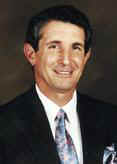A Real American: Are You One?
by Dr. John E.
Bonfadini, Ed.D., Professor Emeritus, George Mason University
|

John Bonfadini
|
Recently, I received an e-mail with an attached letter. It
was one of the many political commentaries floating around on the Internet
these days.
The letter, written by a teacher, expresses her concern
for the direction America is heading. She used the term �real American,�
implying that some Americans are real and others counterfeit. She obviously
believes that her position is that of a real, and not a counterfeit,
American. I thought about her use of the term real American and wondered if
I am one; so I sought out a definition.
Webster�s dictionary defines American as such: Adj. 1. Of,
relating to, or characteristic of the United States of America, its people,
culture, government, or history; 2. Of, in, or pertaining to North or South
America or the Western Hemisphere; 3. Of or pertaining to Indians inhabiting
America; 4. Indigenous to North or South American � American elm, American
elk, etc.
Webster�s also offers the following definition of the word
�real�: Adj. 1. Not imaginary, fictional, pretended; actual;
2. Authentic or genuine; 3. Essential, basic; 4. Being no
less than what is stated; worthy of the name; 5. Serious, not taken lightly;
and others.
The definitions show that Americans can come from two
continents. They may be native, such as the American Indian. They may also
be individuals who come from other parts of the world who are willing to
aspire to a certain belief or culture. I suspect the e-mail letter-writer
was referring to her own narrowly defined way of thinking, one that excludes
many citizens of this nation.
I�ve always felt that the only true Americans are those of
American Indian ancestry. The rest of us believe in a philosophy that�s
framed in the Constitution of the United States. Americans live under this
framework. Two fundamental beliefs outlined in the Constitution are freedom
of speech and religion.
My e-mail letter-writer had a limited view relating to
freedom of religion. Her definition of a real religion seems as narrow as
her definition of a real American. She implied that real Americans are
Christian. Our forefathers recognized the need to respect and give equal
dignity to the religions of all people, even those who choose to have none.
For years, we have given lip service to the freedom-of-religion concept. I
can think of no other topic that is as emotionally charged as religion. It�s
possible to give the topic justice in a small essay such as Food for
Thought, but we as a society must continually examine in our own minds what
is meant by the phrase, �freedom of religion,� and to what degree each of us
is willing to accept the concept in its purest form.
I attended church in Tampa the weekend of July 4th. The
priest gave a homily on what it means to be Catholic in America. He
discussed how being accepted as American was difficult for early Catholic
immigrants, and how many had to set up their own schools and support systems
because they weren�t welcomed in the system that already existed. Many
religions have experienced the same growth process. Our Constitution states
one thing, but our hearts sometimes say another. If real Americans believe
in the fundamental concept of freedom of religion, then we must somehow
learn to implement the idea in our everyday actions. The e-mail
letter-writer can�t pretend any longer and call herself a real American just
because she is of a specific faith. Just as I have the freedom to write this
column, I respect her right to send me her e-mail letter. But I don�t have
to agree with her definition of a real American.
There seems to be plenty of free speech going around, with
people trying to define what real Americans should do and believe. The
proliferation of television and radio �talk shows� underscores our
acceptance of and fascination with free speech. Today we have continuous
conservative and liberal talk-show programming, with show hosts trying to
sell their philosophy, much in the way churches try to promote their
religions as the true one. In my opinion, real Americans don�t necessarily
promote the �left� or the �right,� but rather learn to successfully work in
either environment to promote democracy.
The 15th Amendment to the Constitution speaks to the topic
of race. The e-mail letter I got also spoke in general terms about race.
From her tone, it was obvious that the writer was not looking at the America
I see on the streets or represented in the media. The United States is truly
becoming a melting pot for the world. This is the way the country is headed,
so the letter-writer would be well advised to learn to adapt. Her
occupation, teacher, is the one occupation that should be most tolerant of
diverse views.
The term real American should be defined in the broadest
way � it should include all citizens, regardless of race, color, religion or
philosophical base, as long as respect is given to the Constitution and the
concepts it embodies.
Real Americans, in my view, believe in a constantly
evolving form of government that serves the will of all its citizens without
any footnotes. Am I one? I�m working hard at it, but I must admit that I too
at times have a counterfeit side.
How real are you?